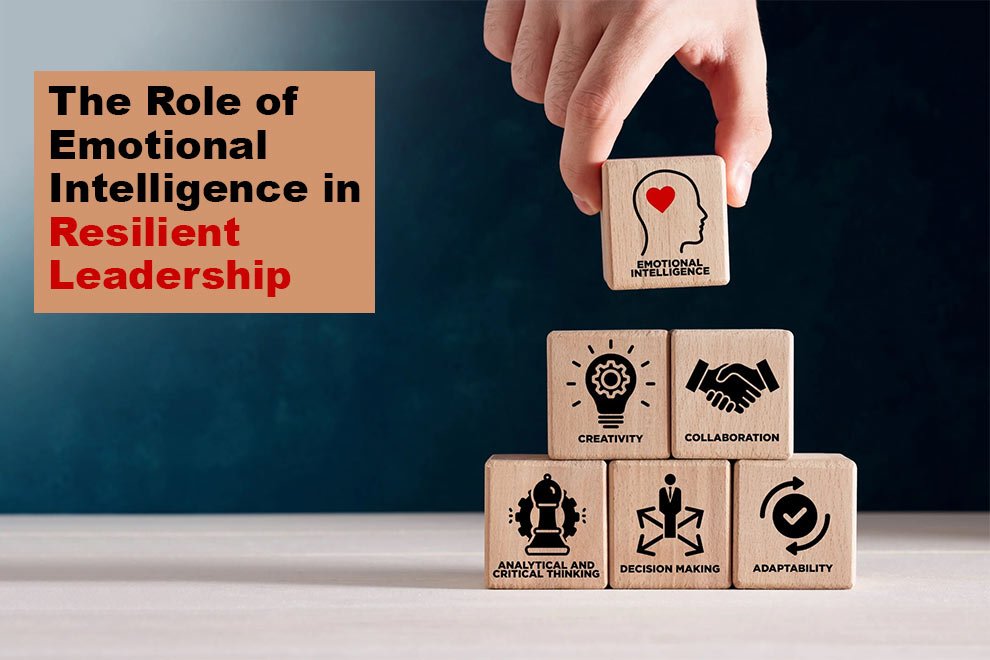In today’s fast-paced and ever-evolving business world, successful leaders must possess the quality of resilience. To adapt, make decisions and navigate challenges effectively, leaders require a sense of emotional intelligence. This involves recognising and understanding emotions in oneself and others and using this insight to guide thoughts and actions. In this post, we will delve into how emotional intelligence plays a role in nurturing leadership.
Understanding Emotional Intelligence
Emotional intelligence comprises four components: self-awareness, self-management, social awareness and relationship management. Let’s explore each component to understand how it contributes to cultivating resilient leadership.
Self-Awareness: The Core Element
Self-awareness is the cornerstone of emotional intelligence. Leaders who possess self-awareness deeply comprehend their emotions, strengths, weaknesses, values, and objectives. They can accurately evaluate their capabilities and adeptly handle their emotions across scenarios. By recognising their reactions and triggers, they are better prepared to manage stressors with poise.
Self-Management: Emotion Regulation
Effective self-management is essential for leadership. Leaders who stand out in this area are skilled at managing their impulses and handling stress effectively in situations. They demonstrate confidence when dealing with uncertainty and maintain a calm attitude when encountering obstacles or setbacks. This ability enables them to instil trust in their team members during times of crisis or change.
Social Awareness: The Vital Role of Empathy
Leaders with awareness excel at perceiving emotions in others, whether within their teams or among external stakeholders. They grasp the viewpoints of those they lead or collaborate with, emphasising the importance of empathy. This quality allows leaders to connect on a level by understanding perspectives and nurturing trust-based relationships, which is essential for swift decision-making.
Relationship Management: Embracing Collaboration and Influence
Effective relationship management is key to fostering leadership. Leaders who adeptly handle relationships can encourage their teams, rally support, manage conflicts constructively and cultivate a collaborative environment. Through their emotional intelligence skills, they can mediate conflicts and positively influence others, even in challenging situations.
Developing Emotional Intelligence in Leadership
Having explored the aspects of emotional intelligence, it is pivotal to delve into how leaders can enhance this critical skill set.
Self Examination
Leaders can benefit from self-reflection to increase their self-awareness. It’s important for them to actively seek feedback from people they trust to understand how their actions affect those around them. Engaging in self-reflection activities like journaling or working with a coach can help them become more self-aware.
Emotional Regulation: Techniques for Managing Emotions
Managing emotions is crucial for leaders, and practising techniques like breathing, mindfulness meditation, or physical exercise can help them handle stress and control reactions effectively.
Empathy Development: Contentment & Active Listening
To improve their empathy and social awareness, leaders should practice active listening by making an effort to understand others’ perspectives without interrupting or judging too quickly. Creating an environment where team members feel listened to and valued fosters trust, collaboration and innovation.
Relationship-Building Initiatives: Transparent Communication
Building relationships within teams is essential for leaders. They should focus on communication channels where team members feel comfortable sharing ideas, concerns and challenges freely. Encouraging feedback helps build trust among team members and creates opportunities for growth.
Decision-Making: Rationality in the Face of Pressure
Leaders who are resilient and possess emotional intelligence demonstrate strong decision-making abilities. They can make choices when facing pressure or dealing with complex situations. Emotional intelligence enables leaders to control their emotions, think clearly, consider perspectives, and make decisions. By utilising their awareness, these leaders can assess risks, effectively evaluate outcomes, and make decisions that support both organisational objectives and the well-being of their team members.
Adaptability: Embracing Change and Uncertainty
In today’s evolving business environment, adaptability is crucial for long-term success. Leaders who excel at adapting to change are adept at thinking, staying flexible and embracing opportunities. Emotional intelligence plays a role in helping leaders navigate uncertainty by enabling them to manage their emotions, show empathy during times of change, and communicate the importance of adaptation effectively. Resilient leaders have confidence in their teams by fostering a culture that embraces change rather than resisting it.
End Note
Emotional intelligence is an important aspect of leadership as it enhances skills such as self-awareness, self-management, social awareness and relationship management. Leaders who excel in these qualities are more prepared to deal with change. They build trust, encourage teamwork and adeptly overcome obstacles. By focusing on enhancing emotional intelligence, leaders can establish a work environment that thrives on flexibility and resilience—a key factor for sustained success in the ever-evolving business world of today.
Also Read: Empathy in Education: Nurturing Emotional Intelligence in the Classroom










